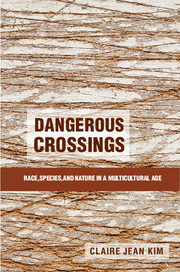Book contents
- Frontmatter
- Dedication
- Contents
- List of Figures and Tables
- Acknowledgments
- Part I Taxonomies of Power
- Part II The Battle over Live Animal Markets in San Francisco’s Chinatown
- Part III Other Disputes
- 7 Makah Whaling and the (Non) Ecological Indian
- 8 Michael Vick, Dogfighting, and the Parable of Black Recalcitrance
- Part IV Conclusion
- References
- Index
7 - Makah Whaling and the (Non) Ecological Indian
Published online by Cambridge University Press: 05 April 2015
- Frontmatter
- Dedication
- Contents
- List of Figures and Tables
- Acknowledgments
- Part I Taxonomies of Power
- Part II The Battle over Live Animal Markets in San Francisco’s Chinatown
- Part III Other Disputes
- 7 Makah Whaling and the (Non) Ecological Indian
- 8 Michael Vick, Dogfighting, and the Parable of Black Recalcitrance
- Part IV Conclusion
- References
- Index
Summary
Whales should not be slaughtered anytime or anywhere by any people.
– Sea Shepherd Conservation SocietyThem [protesters] being here is like bringing a blanket of smallpox.
– Wayne Johnson, Makah Whaling CaptainEarly in the morning of May 17, 1999, in the Pacific waters off of the northwest tip of Washington State, a three-year-old female gray whale swam up alongside a canoe of Makah hunters, expressing the curiosity that many gray whales show toward humans. Theron Parker, the harpooner, stood up, and launched the first of three harpoons into her back. The hunt was being filmed, and television viewers across the globe watched “as the wounded whale struggled, twisting and zig-zagging, pulling the Makah hunters a short distance, three harpoons lodged in her 30-foot body.” As “bloodied waters swelled outward from the dying whale in crimson waves,” the Makah hunters then shot her three times with a powerful rifle. The last bullet penetrated the gray whale’s brain and killed her. The broadcasting of the hunt prompted both exultation on the part of many Makah and intense expressions of sorrow and outrage on the part of other Makah and non-Makah. Alberta Thompson, a Makah elder who opposed the hunt, named the whale who had been killed “Yabis,” which means “beloved” in the Makah language.
It was the first time that the Makah had successfully hunted a whale in more than seventy years. Once legendary whale hunters of the Pacific Northwest Coast, the Makah ceased whaling in the 1920s, in part because of the depletion of whale populations brought about by European and American commercial whaling. Since that time, international and domestic practice and opinion had largely turned against whaling, so the tribe’s announcement in the mid-1990s that it wished to resume whaling set off a global firestorm that raged from the Makah reservation in Neah Bay to the National Marine Fisheries Service in Washington, DC to International Whaling Commission meetings in Europe over what constitutes a subsistence hunting tradition, who owns the seas and living marine resources, the biological and moral status of the gray whale, the cultural rights of indigenous peoples, and the imperatives of environmental protection.
- Type
- Chapter
- Information
- Dangerous CrossingsRace, Species, and Nature in a Multicultural Age, pp. 205 - 252Publisher: Cambridge University PressPrint publication year: 2015
- 1
- Cited by



